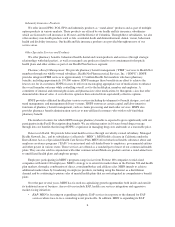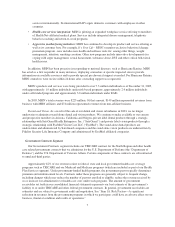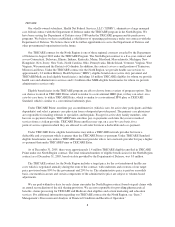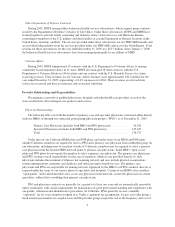Health Net 2005 Annual Report Download - page 18
Download and view the complete annual report
Please find page 18 of the 2005 Health Net annual report below. You can navigate through the pages in the report by either clicking on the pages listed below, or by using the keyword search tool below to find specific information within the annual report.• the scope of benefits required to be made available to members,
• procedures for review of quality assurance,
• enrollment requirements,
• procedures for resolving grievances,
• adequacy and accessibility of the network of health care providers,
• timely and accurate payment of provider claims,
• initial and continuing financial viability of the HMO and its risk-bearing providers,
• provision of services that are culturally and linguistically accessible, and
• composition of policy-making bodies to assure that plan members have access to representation.
On September 28, 2000, Assembly Bill 1455 (“AB 1455”) was signed into law. AB 1455 amended and
added several sections to the Knox-Keene Act. As required by AB 1455, the DMHC adopted final regulations
(the “AB 1455 Regulations”) addressing both claims reimbursement and provider dispute resolution procedures.
The AB 1455 Regulations include new and substantial requirements concerning provider claims handling, such
as limitations on the health plans’ ability to limit the time of submission of claims by providers, standards for
payment of providers who are not contracted with the plan, recovery of overpayment notifications to providers
regarding the payment or denial of their claims, disclosure requirements as to fee schedules and payment
policies, and limitations on payment policy changes. The AB 1455 Regulations also include detailed rules
concerning provider appeal rights and the plans’ responsibilities in providing a fast and fair dispute resolution
mechanism, including restrictions on the plans’ timely submission requirements, time period for resolution of an
appeal and for the written explanation of the plans’ determinations, and an annual regulatory reporting
requirement by plans. The AB 1455 Regulations also apply to the health plans’ provider groups to which the
plans have delegated claims payment and provider appeal functions, and the plans are required to have in place
certain oversight mechanisms to assure compliance by their delegated provider groups. In January 2006, the
DMHC released a written draft for an 18-month pilot program to provide independent arbitration of plan/
provider disputes to be effective in October 2006. No assurance can be given as to whether this proposal will be
implemented in 2006 in this or any other form.
Any material modifications to the organization or operations of HN California and MHN are subject to prior
review and approval by the DMHC. This approval process can be lengthy and there is no certainty of approval.
Other significant changes require filing with the DMHC, which may then comment and require changes. In
addition, under the Knox-Keene Act, HN California and MHN must file periodic reports with, and are subject to
periodic review and investigation by, the DMHC. Non-compliance with the Knox-Keene Act, including the
provisions added and amended by AB 1455, may result in an enforcement action, fines and penalties, and, in the
most severe cases, limitations on or revocation of the Knox-Keene license.
Other Laws and Regulations
In each state in which our HMO and insurance subsidiaries (collectively, “regulated subsidiaries”) do
business, our regulated subsidiaries must meet numerous state licensing criteria and secure the approval of state
licensing authorities before implementing certain operational changes, including the development of new product
offerings and, in some states, the expansion of service areas. State departments of insurance (“DOIs”) regulate
our insurance business under various provisions of state insurance codes and regulations. To remain licensed,
each regulated subsidiary must continue to comply with state laws and regulations and may from time to time be
required to change services, procedures or other aspects of its operations to comply with changes in applicable
laws and regulations. In addition, regulated subsidiaries must file periodic reports with, and their operations are
subject to periodic examination by, state licensing authorities. Our regulated subsidiaries are required by state
law to meet certain minimum capital and deposit and/or reserve requirements in each state and may be restricted
16
























